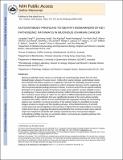| dc.contributor.author | Tang, Liangdan | |
| dc.contributor.author | Yang, Junzheng | |
| dc.contributor.author | Ng, Shu-Kay | |
| dc.contributor.author | Rodriguez, Noah | |
| dc.contributor.author | Choi, Pui-Wah | |
| dc.contributor.author | Vitonis, Allison | |
| dc.contributor.author | Wang, Kui | |
| dc.contributor.author | McLachlan, Geoffrey J. | |
| dc.contributor.author | Caiazzo, Robert J. | |
| dc.contributor.author | Liu, Brian C.-S. | |
| dc.contributor.author | Welch, William Robert | |
| dc.contributor.author | Cramer, Daniel William | |
| dc.contributor.author | Berkowitz, Ross Stuart | |
| dc.contributor.author | Ng, Shu-Wing | |
| dc.date.accessioned | 2016-06-17T15:22:09Z | |
| dc.date.issued | 2010 | |
| dc.identifier.citation | Tang, Liangdan, Junzheng Yang, Shu-Kay Ng, Noah Rodriguez, Pui-Wah Choi, Allison Vitonis, Kui Wang, et al. 2010. “Autoantibody Profiling to Identify Biomarkers of Key Pathogenic Pathways in Mucinous Ovarian Cancer.” European Journal of Cancer 46 (1) (January): 170–179. doi:10.1016/j.ejca.2009.10.003. | en_US |
| dc.identifier.issn | 0959-8049 | en_US |
| dc.identifier.uri | http://nrs.harvard.edu/urn-3:HUL.InstRepos:27334949 | |
| dc.description.abstract | Mucinous epithelial ovarian cancers are clinically and morphologically distinct from the other histopathologic subtypes of ovarian cancer. Unlike other ovarian subtypes, epidemiologic studies have indicated that tobacco exposure is a significant risk factor for developing mucinous ovarian cancer. Detection of autoantibody reactivity is useful in biomarker discovery and for explaining the role of important pathophysiologic pathways in disease. In order to study if there are specific antibody biomarkers in the plasma samples of mucinous ovarian cancer patients, we have initiated a screen by employing a “reverse capture antibody microarray” platform that uses native host antigens derived from mucinous ovarian tissues as “baits” for the capture of differentially labeled patient and control autoantibodies. 35 autoantibodies that were significantly elevated in the cancer plasma samples compared with healthy controls, and six autoantibodies that segregated smoking and nonsmoking patients were identified. Functional annotation of the antibody targets has identified nine target antigens involved in integrin and Wnt signaling pathways. Immunohistochemistry of archived ovarian specimens showed significant overexpression of eight of the nine target antigens in mucinous ovarian tumor tissues, suggesting that plasma autoantibodies from mucinous ovarian cancer patients might have heightened reactivities with epitopes presented by these overexpressed antigens. Autoantibody profiling may have an unexpected utility in uncovering key signaling pathways that are dysregulated in the system of interest. | en_US |
| dc.language.iso | en_US | en_US |
| dc.publisher | Elsevier BV | en_US |
| dc.relation.isversionof | doi:10.1016/j.ejca.2009.10.003 | en_US |
| dc.relation.hasversion | http://www.ncbi.nlm.nih.gov/pmc/articles/PMC2794928/ | en_US |
| dash.license | LAA | |
| dc.subject | Autoantibody | en_US |
| dc.subject | Ovarian cancer | en_US |
| dc.subject | smoking | en_US |
| dc.subject | profiling | en_US |
| dc.subject | signaling pathway | en_US |
| dc.title | Autoantibody profiling to identify biomarkers of key pathogenic pathways in mucinous ovarian cancer | en_US |
| dc.type | Journal Article | en_US |
| dc.description.version | Accepted Manuscript | en_US |
| dc.relation.journal | European Journal of Cancer | en_US |
| dash.depositing.author | Cramer, Daniel William | |
| dc.date.available | 2016-06-17T15:22:09Z | |
| dc.identifier.doi | 10.1016/j.ejca.2009.10.003 | * |
| dash.authorsordered | false | |
| dash.contributor.affiliated | Berkowitz, Ross | |
| dash.contributor.affiliated | Welch, William | |
| dash.contributor.affiliated | Ng, Shu-Wing | |
| dash.contributor.affiliated | Cramer, Daniel | |


